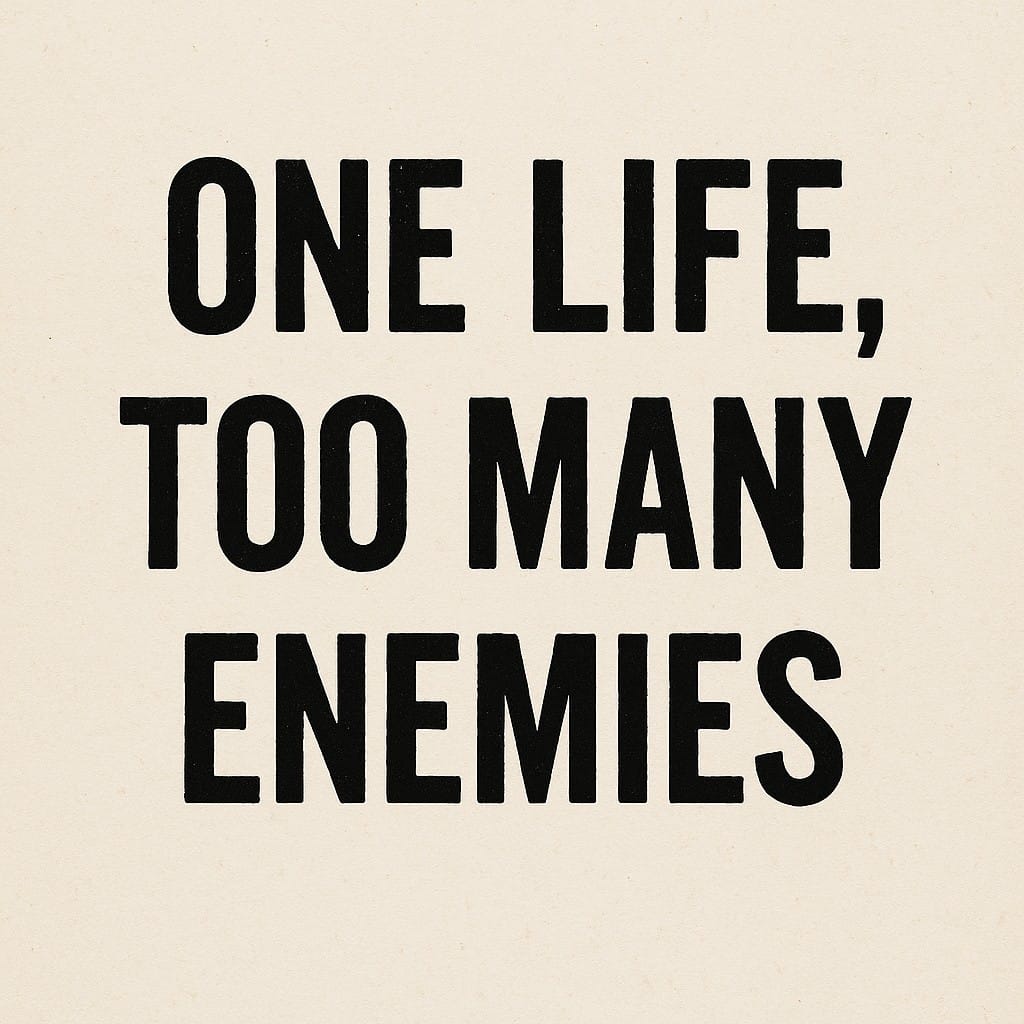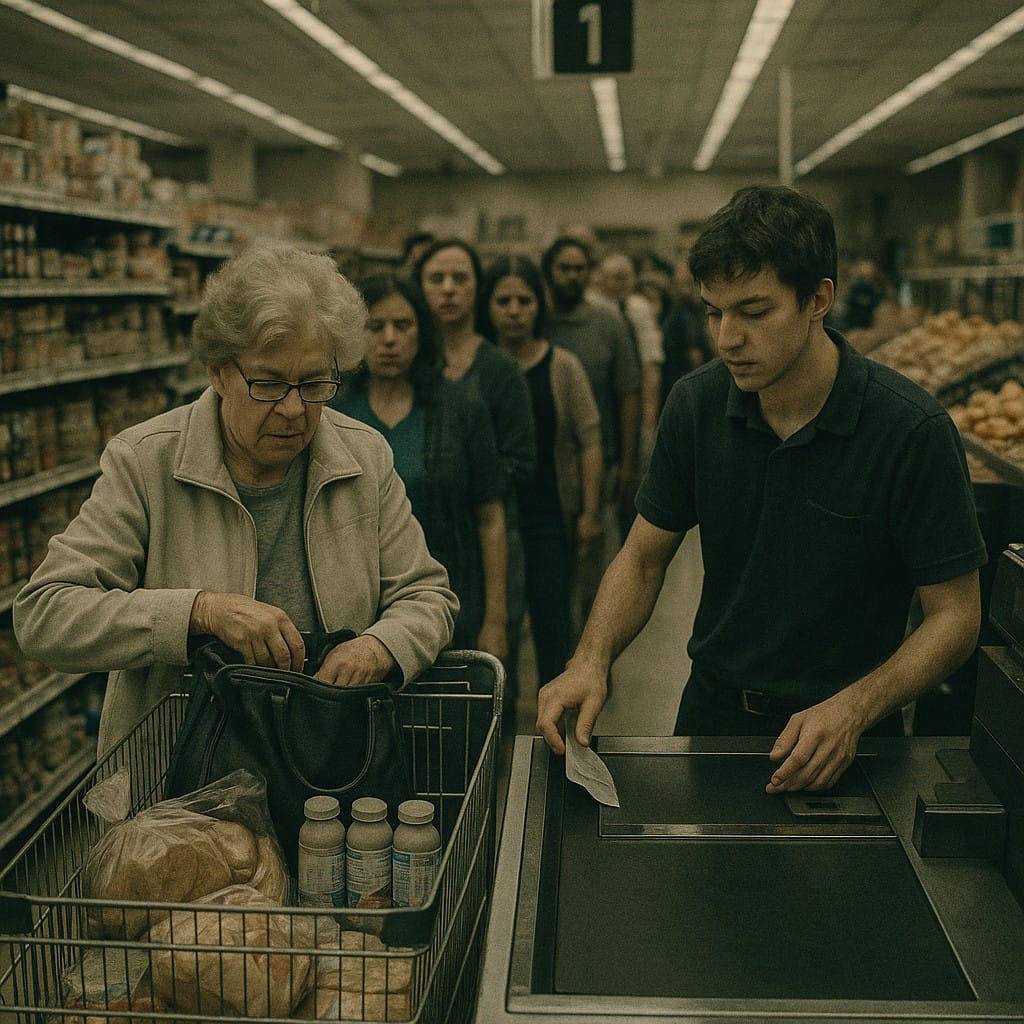
So, I'm standing in this grocery store last month. I use the term "standing" loosely because it was more like being trapped in a slow-motion stampede.
Picture this: Saturday afternoon, the payment systems have apparently achieved sentience and chosen violence, and there's exactly one human cashier trying to process what looks like the entire cast of a zombie apocalypse movie, except everyone's holding coupons.
There's this woman ahead of me – we’ll call her a senior, with one of those carts that's somehow both overflowing and weirdly organized, like she's prepared for either a dinner party or the end times. Her card keeps getting declined, she's excavating her purse like an archaeologist, and you can literally watch her Saturday falling apart in real time. The cashier looks like he's three customers away from a complete existential breakdown.
And my brain immediately goes to that special place of righteous irritation we all know and love: Seriously? Figure out your financial situation before you get to the front of the line, lady. Because clearly the problem here is this one woman, not the fact that we've somehow built a society where buying food requires navigating technology that would confuse a NASA engineer.
But then I actually looked at what she was buying - basic groceries, nothing fancy, plus a bunch of those Ensure drinks that become a food group when you're older and eating stops being fun and starts being medical maintenance. And something clicked. Here's someone who's probably already overwhelmed by a world that updates faster than she can learn it, standing in a store designed by people who think shopping should feel like a video game, trying to buy necessities with a payment system that apparently requires a computer science degree.

Instead of anyone acknowledging that this setup is fundamentally absurd, we're all just quietly hoping she'll disappear so we can get back to our own personal battles with machines that barely work.
This keeps haunting me, especially when I'm scrolling through whatever fresh hell is trending this week. Because somehow, we've decided that our biggest national crisis is... people who slow down the grocery line? The ones who need an extra minute to figure out which way the chip goes? That's the hill we're dying on?
Look, I get why this happens. The world feels like it's being held together with dollar-store duct tape right now. Everything costs twice what it should, nothing works the way it's supposed to, and when someone hands you a simple villain - "It's because of those people" - that's way more satisfying than admitting that most of our problems come from systems designed by people who've never actually had to use them.
But here's the thing that keeps me up at night: we're letting politicians turn us into people our childhood selves would find deeply weird. Remember being eight years old? When you made a new friend, did you first run a background check on their family's documentation? When your neighbour needed help with something heavy, did you demand to see their voting record first? Of course not, because basic human decency used to be the default setting, not some radical political position.
Now don't get me wrong - I'm not entirely naive here. There are real policy differences that actually matter, and some politicians have made entire careers out of making vulnerable people's lives worse. But we've somehow jumped from "these are serious issues that need addressing" to "that person buying groceries with food stamps is personally responsible for everything wrong with America," and that leap should probably concern us more than it does.
What really gets me is how hilariously temporary all of this is. Not the policies - those can mess up real lives for decades. But we, the people getting worked up about it. You, me, that woman with the declining card, the politician whose face makes you want to throw your phone across the room, that neighbour whose lawn sign fills you with inexplicable rage - we're all going to be mulch in maybe fifty years. Probably less, given how things are going.
When I put it in that perspective, the whole thing starts feeling pretty ridiculous. Like, this is really how we want to spend our brief, unlikely existence? Getting our blood pressure up about strangers we've never met, based on stories told by people whose entire business model depends on keeping us perpetually furious?
Because here's what sounds impossibly naive but might actually be true: most people are just trying not to drown. Even the ones who vote for people you think are cartoon villains. Even the ones who believe things that make you want to scream into the void. They're worried about their kids, stressed about money, and hoping their car makes it through another month. You know, the same things keeping you up at night, just filtered through different fears and different information sources.
I'm not saying we should all hold hands and pretend everything's fine - some fights are genuinely worth having, and some boundaries really do need defending. Let's start with the absolutely revolutionary idea that the person across from us isn't the devil in human form, just someone else trying to figure out how to navigate systems that seem designed by people who hate users.
What if that person who supports policies that make you want to leave the country isn't evil, just scared about things you haven't thought about? What if the person whose life choices seem completely baffling is trying to find some happiness in this beautiful, terrifying experiment we're all part of?
I realize this sounds like toxic positivity when we're dealing with politicians who literally campaign on making certain groups of people suffer. But here's the beautiful part - they need us to hate each other for their whole grift to work. The more we see our neighbours as existential threats, the more we need these politicians to protect us from those threats. It's the oldest con in politics, and we keep falling for it because anger feels so much more satisfying than sitting with complexity.
Maybe the real rebellion is just refusing to play their game and deciding to see people as people even when it's inconvenient. Remembering that behind every political opinion is someone who has morning breath and worries about people they love and occasionally has minor meltdowns in grocery store checkout lines.
That woman? Turns out her card was declining because her bank had flagged suspicious activity after someone tried to use her information to buy stuff online. She was getting groceries for herself and her neighbour, who'd just gotten out of the hospital and couldn't drive yet. The cashier - this kid who probably makes barely enough to afford his own groceries - stayed with her while she called the bank, even though the line was wrapping around the produce section like some kind of organic conga line.
Not because corporate policy required it, but because sometimes being human is actually that simple.
We get exactly one shot at this ridiculous, beautiful, impossible thing called life. One chance to decide what kind of people we want to be. And I can't shake this feeling that we're completely wasting it on hating strangers who are probably way more like us than any of us wants to admit.
Maybe that's naive. Perhaps the stakes really are too high for basic human decency. But honestly? I'd rather be naive and kind than clever and cruel. Because when this whole thing is over, I want to be someone that eight-year-old me would have actually liked hanging out with.
You know, back before being told that some people apparently don't count as people.
That kid might have been onto something.


